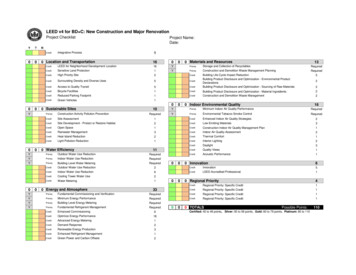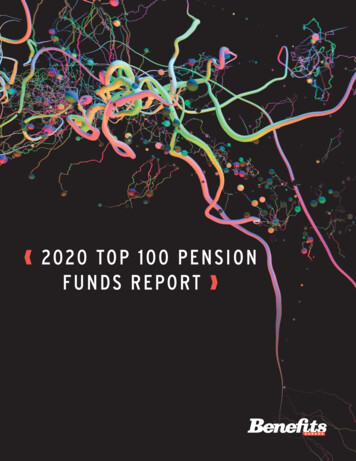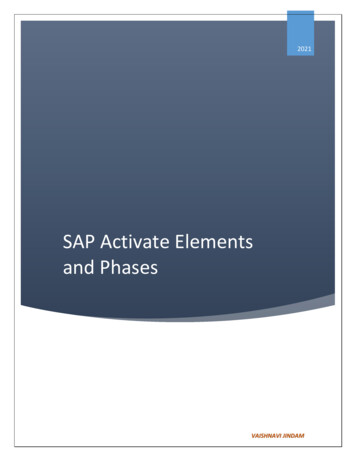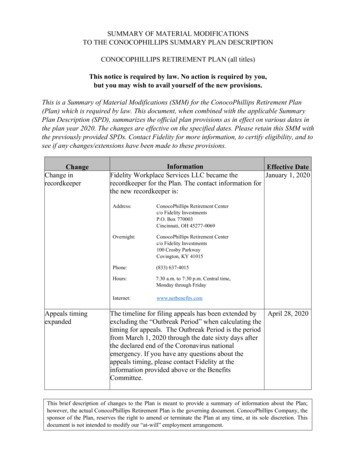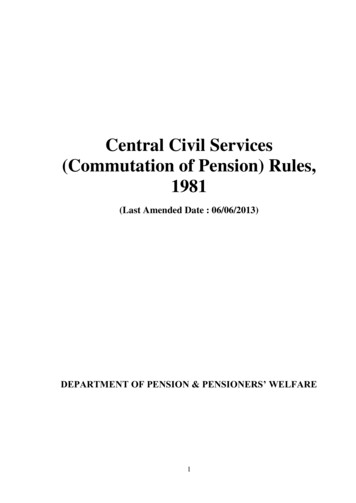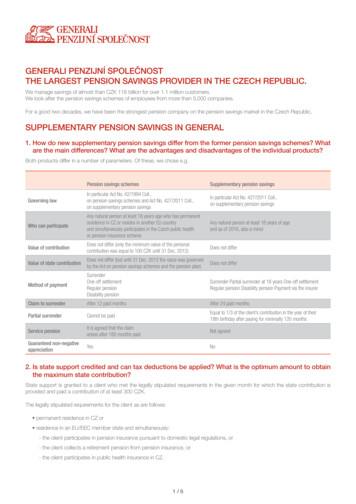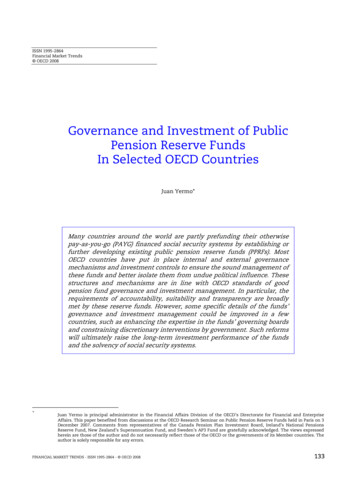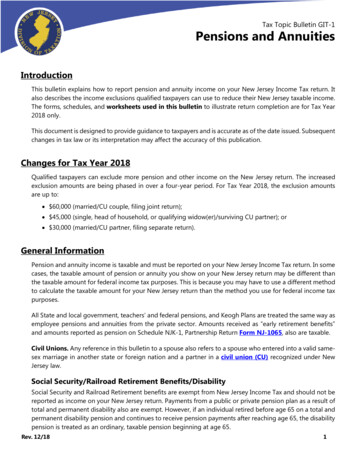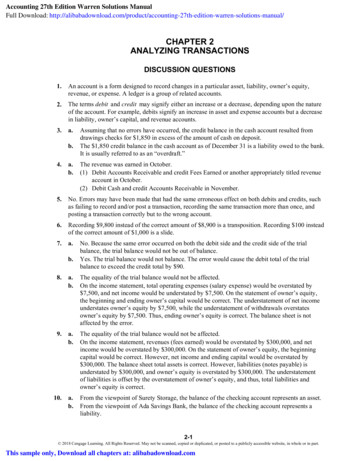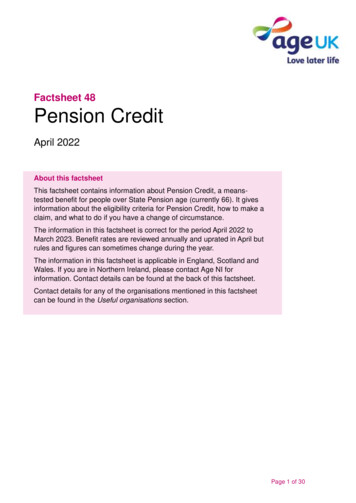
Transcription
Factsheet 48Pension CreditApril 2022About this factsheetThis factsheet contains information about Pension Credit, a meanstested benefit for people over State Pension age (currently 66). It givesinformation about the eligibility criteria for Pension Credit, how to make aclaim, and what to do if you have a change of circumstance.The information in this factsheet is correct for the period April 2022 toMarch 2023. Benefit rates are reviewed annually and uprated in April butrules and figures can sometimes change during the year.The information in this factsheet is applicable in England, Scotland andWales. If you are in Northern Ireland, please contact Age NI forinformation. Contact details can be found at the back of this factsheet.Contact details for any of the organisations mentioned in this factsheetcan be found in the Useful organisations section.Page 1 of 30
Contents1 What is Pension Credit?42 Who qualifies for PC?42.1 Basic requirements42.2 Mixed age couples52.3 Single person52.4 Income-related criteria62.5 Residence and immigration requirements63 Current rates64 Appropriate minimum guarantee74.1 Standard minimum guarantee74.2 Severe disability74.3 Carers84.4 Children94.5 Housing costs105 Working out amount136 How to claim186.1 Backdating and advance claims186.2 Moving to Pension Credit from working age benefits186.3 If the Pension Service needs more information196.4 Delays and complaints197 Decisions and payment197.1 If you disagree with a decision197.2 Payment198 Change of circumstances and assessed income periods208.1 Assessed income periods208.2 Change of circumstances with no AIP218.3 If you go into hospital218.4 If you go into a care home22Age UK factsheet 48Pension CreditApril 2022Page 2 of 30
8.5 If you go abroad238.6 If PC stops for a mixed age couple238.7 Becoming a mixed-age couple when claiming PC248.8 Equity release249 Other benefits if you receive Pension Credit249.1 TV licence concessions2510 DWP Guidance25Useful organisations27Age UK29Support our work29GlossaryAA – Attendance AllowanceCA – Carer’s AllowanceDLA – Disability Living AllowanceEEA – European Economic AreaHB – Housing BenefitPC – Pension CreditUC – Universal CreditAge UK factsheet 48Pension CreditAIP – Assessed Income PeriodCTS – Council Tax SupportDWP – Department for Work and PensionsESA – Employment and Support AllowanceJSA – Jobseeker’s AllowancePIP – Personal Independence PaymentApril 2022Page 3 of 30
1What is Pension Credit?Pension Credit (PC) is made up of two parts:Guarantee Credit provides a guaranteed level of income for people overState Pension age (currently 66). Guarantee Credit is worked out bycomparing your income with an amount the government says you needto live on. If you have a disability, are a carer, have children, or have topay housing costs, you may be eligible for a higher amount.Savings Credit is paid to people who reached State Pension age before6 April 2016 and only such people can make a new claim for it. Existingclaimants can continue to receive it. Savings Credit is worked out bylooking at the level of retirement provision you have made. It may bepaid as well as Guarantee Credit or on its own.You do not need to have paid National Insurance contributions to qualifyfor PC. Some income and capital is taken into account but some isdisregarded. There is no upper capital limit. You can work and receivePC, but most of your earnings are taken into account as income. PC isnot taxable. It can be paid to homeowners, tenants, and people in othercircumstances such as living with family or friends. It is administered bythe Pension Service, part of the DWP.NoteWhen the factsheet refers to PC without specifying GuaranteeCredit or Savings Credit, the information applies to both. Where therules are different, this is clearly stated, for example: ‘Thecalculation of Savings Credit is based on your income and there is acap on the amount you receive’.2Who qualifies for PC?You claim PC as a single person or jointly as a couple if you have apartner (one partner must claim for both of you). Your partner is yourhusband, wife, civil partner, or someone you live with as though you aremarried/civil partners. If you have a partner, your joint income and capitalis taken into account when the amount of your PC award is calculated.2.1Basic requirementsTo claim PC, you must: have reached State Pension age (if you are a couple, see section 2.2; ifyou are single, see section 2.3) meet the income-related criteria (see section 2.4) satisfy the applicable residency conditions (see section 2.5).Age UK factsheet 48Pension CreditApril 2022Page 4 of 30
2.2Mixed age couplesA mixed age couple is where one person is over State Pension age andthe other person is under. You cannot claim PC until both partners havereached State Pension age. Instead, you can claim Universal Credit. Thetable below shows when you can claim PC based on the date of birth ofthe younger partner.Date of BirthDate you can claim PCBefore 6 October 1954You can claim now6 October 1954 to 5 April 196066th birthdayState Pension age increasesFrom 6 May 2026, State Pension age starts increasing again andwill reach 67 by 6 March 2028 (affecting anyone born between 6April 1960 and 5 April 1977).You can find your own State Pension age and the date you reach itby using the calculator at www.gov.uk/calculate-state-pension or byphoning the Future Pension Centre on 0800 731 0175.Existing mixed age PC couples who were entitled on 14 May 2019 canstay on PC provided there is no break in the claim. You also remainentitled to PC if you claim and are awarded Attendance Allowance orPersonal Independence Payment.Further, if you were claiming Housing Benefit (HB) under pension agerules on 14 May 2019, you can make a new PC claim if the HB awardhas been paid continuously since this date.Note, if you are part of a mixed-age couple who have continuouslyclaimed HB since 14 May 2019, as well as one of the following benefits: Income-related Employment and Support Allowance Income Support Income-based Jobseeker’s Allowance.then your HB claim is paid under working-age rules and you can onlymake a new PC claim when you both reach State Pension age.2.3Single personIf you are single, the table above applies based on your date of birth.Age UK factsheet 48Pension CreditApril 2022Page 5 of 30
2.4Income-related criteriaGuarantee Credit is calculated by comparing your income with yourappropriate minimum guarantee (see section 4). The calculation ofSavings Credit is based on your income and there is a cap on theamount you receive. The income rules are described in section 5.2.5Residence and immigration requirementsYou must be present in Great Britain, habitually resident and not subjectto immigration control.EEA citizensIf you are an EEA citizen (except Irish citizens who do not needleave to remain in the UK) and have ‘settled status’, you haveindefinite leave to remain in the UK and are not subject toimmigration control. If you currently have ‘pre-settled status’ orarrived in the UK after this date, see DWP Guidance in section 10for more information.Residence tests and immigration conditions can be complex.Contact Age UK Advice or a local advice centre for help.3Current ratesThe Guarantee Credit maximum weekly amounts for 2022/23 are:Single people 182.60Couples 278.70 The additional amount for severe disability is 69.40. The additional amount if you are a carer is 38.85. The additional amount if you have children depends on yourcircumstances, see section 4.4.The Savings Credit maximum weekly amounts for 2022/23 are:Single people 14.48Couples 16.20You may be paid less than the amounts above, depending on yourincome and your capital.Age UK factsheet 48Pension CreditApril 2022Page 6 of 30
4Appropriate minimum guaranteeYour appropriate minimum guarantee is the amount of money thegovernment thinks you need to live on each week. It is made up of thestandard minimum guarantee for a single person or couple, plus anyextra amounts you are entitled to for severe disability, caringresponsibilities, children, or housing costs. The appropriate minimumguarantee is often referred to as the ‘appropriate amount’.4.1Standard minimum guaranteeThe weekly standard minimum guarantee is 182.60 for a single personand 278.70 for a couple. If your income is less than this and you meetthe other qualifying conditions, you may qualify for Guarantee Credit. Ifyour income is higher, you may qualify if you are entitled to any of theextra amounts in this section, or if some of your income can bedisregarded.4.2Severe disabilityAn additional amount for severe disability can be included in yourappropriate minimum guarantee if: you get AA, DLA middle or high rate care component, or PIP daily livingcomponent (Adult Disability Payment in Scotland), and no one is paid Carer’s Allowance to look after you (it does not matter ifsomeone has an ‘underlying entitlement’ to Carer’s Allowance), and you live alone or are treated as living alone.‘Living alone’You can be treated as if you live alone even if you share your home withother people. The following people are ignored when deciding if you areliving alone: someone receiving AA, DLA middle or high rate care component, or PIPdaily living component (Adult Disability Payment in Scotland) someone registered blind or severely sight impaired a child or young person under 18 or for whom Child Benefit is being paid a joint tenant or co-owner who is not a close relative your landlord if they are not a close relative a licensee, tenant, or sub-tenant who is not a close relative some live-in helpers.If you have your own accommodation under the same roof as someoneelse, for example in a self-contained annexe, you are not sharing a homeand you count as living alone.Age UK factsheet 48Pension CreditApril 2022Page 7 of 30
If you are a single person and you qualify for the severe disabilityaddition, an extra 69.40 a week is included in your appropriateminimum guarantee.If you have a partner and only one of you gets AA, DLA or PIP, you onlyget the severe disability addition if the other person is registered blind orseverely sight impaired.If you both receive AA, DLA or PIP and no one else counts as living withyou, and neither of you has a carer receiving Carer’s Allowance, acouple rate of 138.80 a week is included.If you both receive AA, DLA or PIP but one of you has a carer who isactually paid Carer’s Allowance, the single rate of 69.40 is included.ActionThis is a complex area and if you need more information aboutwhether you qualify for the severe disability addition, contact AgeUK Advice, Age Cymru Advice, or a local advice service.4.3CarersThe additional amount for a carer can be included in your appropriateminimum guarantee if you or your partner: receive Carer’s Allowance, or have claimed Carer’s Allowance and fulfil the conditions for it but cannotbe paid it as you get State Pension or another benefit instead. In thiscase, you have an ‘underlying entitlement’ to Carer’s Allowance.If you are single and qualify for the carer addition, an extra 38.85 aweek is included in your appropriate minimum guarantee.If both you and your partner qualify for the carer addition, an extra 77.70 a week is included. If only one of you is a carer, the single rate isincluded.The carer addition continues for eight weeks after you stop looking aftersomeone if, for example, they die or move into a care home.Where Carer’s Allowance is being paid, a carer can receive an extra 38.85 a week through the carer addition but the person they care formight lose their severe disability addition, which is worth 69.40. If youare not sure whether to claim Carer’s Allowance, seek advice first.It is possible to receive both the carer and severe disability additionalamounts. For example a disabled couple who provide substantialamounts of care for each other can receive both. This applies if bothCarer’s Allowance claims are not in payment and there is underlyingentitlement only, otherwise the severe disability additional amounts arenot paid. See factsheet 55, Carer’s Allowance, for more information.Age UK factsheet 48Pension CreditApril 2022Page 8 of 30
Example for single carerElsa is 70 and looks after her husband who gets AA. She applies forCarer’s Allowance and receives a decision saying she fulfils theconditions but it cannot be paid on top of her State Pension. Shehas an underlying entitlement only. Her PC award is increased by 38.85 a week – the carer addition.Example for a couple of carersJohn and Lucy are both awarded AA and they claim Carer’sAllowance for each other. Both have a State Pension worth morethan Carer’s Allowance so they have an underlying entitlement only.Their Pension Credit increases by 77.70 a week (two carersadditions of 38.85 a week are payable). As Carer’s Allowance isnot paid to either of them, they qualify for the severe disabilityamount of 138.80 a week. In total, their PC increases by 216.50 aweek (2 carer additions and 2 severe disability additions).4.4ChildrenAn additional amount for children can be included in your appropriateminimum guarantee if you are responsible for a child (aged up to 16 orup to 20 if they are in approved training or education), they normally livewith you, and you do not have an existing award of Tax Credits.The weekly amount included in your appropriate minimum guarantee foreach applicable child is:First child (if born before 6 April 2017) 66.85First child (if born on or after 6 April 2017) andsubsequent children 56.35A ‘disabled child’ additional amount can also be included for eachapplicable child entitled to either:DLA (low or middle rate care component) or PIP(standard rate daily living component) 30.58DLA (high rate care component), PIP (enhanced ratedaily living component) or certified as severely sightimpaired or blind 95.48Age UK factsheet 48Pension CreditApril 2022Page 9 of 30
4.5Housing costsIf you rent your home, you can apply for pension age Housing Benefit tohelp with rent and service charges, see factsheet 17, Housing Benefit.If you own your home and pay other housing-related charges, you maybe eligible for extra amounts within PC. If other adults live with you (‘nondependants’), they may be expected to contribute towards costs, even ifthey do not pay you any money and deductions from your benefit may bemade. If you jointly own the property with someone other than yourpartner, you only get help with your share of the costs.ActionThis is a complex area with many exceptions. You may want to seekfurther advice from Age UK Advice, Age Cymru Advice, AgeScotland or a local advice service.For more information, see DWP guidance in section 10.Service chargesIf you must pay service charges as a condition of living in your home,your appropriate minimum guarantee can include help towards some ofthese. Reasonable charges for the following are eligible: services for the provision of adequate accommodation including somewarden and caretaker services, gardens, lifts, entry phones, portering,rubbish removal, TV and radio relay charges laundry facilities like a laundry room in a sheltered housing scheme butnot personal laundry services cleaning of communal areas and windows minor repairs and maintenance (not major repairs and improvements you may get help with interest on a loan to pay for these, see below) home insurance if it must be paid under the terms of the lease.Service charges for community or emergency alarms, personal care andsupport services are not covered. You may be able to get help with thissupport from your local authority.If you apply for help with service charges, you may be asked to supplydocumentary evidence, for example accounts, invoices and a breakdownof the charges. The total eligible service charges are converted into aweekly amount and added to your appropriate minimum guarantee.ExamplePhyllis pays 590 a year in service charges, all for eligible services,apart from 70 for an alarm system. The remaining 520 is dividedby 52. 10 a week is added to her appropriate minimum guarantee.Age UK factsheet 48Pension CreditApril 2022Page 10 of 30
Ground rent and other housing costsYou can get help with other housing costs through PC including: ground rent if you have a lease of more than 21 years payments under a co-ownership scheme rent if you are a Crown tenant (minus any water charges) payments for a tent and its pitch, if that is your home.The normal weekly charge for these costs is added to your appropriateminimum guarantee. If the charges are payable annually, the weeklyamount is worked out by dividing the annual amount by 52.Non-dependant deductionsThe amount of housing costs included in your appropriate minimumguarantee may be reduced if someone else lives with you other thanyour partner or dependent children, called a ‘non-dependant’ deduction.Deductions are made because it is assumed someone living with you,such as an adult son or daughter, contributes towards your housingcosts. The sums deducted are fixed regardless of how much, or if at all,the person actually contributes.If you have more than one non-dependant, there is a deduction for eachof them but only one deduction is made for a couple. The deduction for acouple is the highest that would have been made if they were treated asindividuals but based on their joint income.Where a non-dependant deduction must be made, a fixed amount isdeducted. The deduction is 16.45 a week unless the person works 16hours a week or more, does not get PC, and has a gross income of atleast 154 a week, in which case the following rates apply:Gross weekly income of nondependantWeekly deduction fromhousing costs 154.00– 223.99 37.80 224.00– 291.99 51.85 292.00– 388.99 84.85 389.00– 483.99 96.60 484.00 or more 106.05When assessing the gross income of a non-dependant, most income iscounted apart from AA, DLA, or PIP which are disregarded.Age UK factsheet 48Pension CreditApril 2022Page 11 of 30
If you apply for housing costs and have a non-dependant, you mustproduce evidence of their income, for example pay slips or benefitentitlement letters.If a non-dependant joins your household, or their income changes andthis would reduce your PC award, the change should not apply until 26weeks after the date of change.No deductions are made if you (or your partner) are registered as blind,or receive AA, DLA care component or PIP daily living component, orthey are already being made from your Housing Benefit.No deductions are made for any non-dependant who is: a joint owner or joint tenant with you a boarder or sub-tenant receiving Pension Credit under 25 receiving Universal Credit, provided they do not have earnedincome under 25 receiving Income Support, income-based JSA, or incomerelated ESA provided it does not include a work-related activity orsupport component a full-time student, provided they are not working in the summer break,and people on some training allowances aged under 18 (or under 20 in certain situations) for whom you areresponsible employed by a charitable or voluntary organisation as a resident carerfor you or your partner and who you pay for that service staying with you but who normally lives elsewhere in hospital for more than 52 weeks a prisoner.Support for mortgage interest and home loansThis support does not count as housing costs under the appropriateminimum guarantee, but takes the form of a repayable loan.A charge is placed on your property and you must repay the total amountreceived, plus compound interest, when the property is sold ortransferred (unless you ‘port’ your loan over to a new property), or whenthe last one of you dies if you are a couple.You should consider getting financial advice before taking out a loan.For more information about this and the eligibility criteria, seewww.gov.uk/support-for-mortgage-interestAge UK factsheet 48Pension CreditApril 2022Page 12 of 30
5Working out amountGuarantee Credit is worked out by comparing your income with yourappropriate minimum guarantee. Your income is added up and deductedfrom your appropriate minimum guarantee. The difference is the amountof Guarantee Credit you are entitled to.Step 1: Working out your appropriate minimum guaranteeYour appropriate minimum guarantee is made up of: standard minimum guarantee for you (and your partner), plus any additional amounts you are entitled to (see sections 4.2 to 4.5).ExampleSarah is single and aged 67. She has underlying entitlement toCarer’s Allowance and looks after her disabled mother who gets AA.Her standard minimum guarantee is 182.60. She is entitled to theadditional carer’s amount of 38.85. Her total appropriate minimumguarantee is 221.45 a week.Step 2: Working out your incomeIncome for PC is assessed after deductions for tax and NationalInsurance contributions. If you contribute to an occupational or personalpension scheme, half of your contributions do not count as income.Only defined income (see DWP Guidance in section 10), less anydisregarded amounts, is used to calculate your total weekly income. Anyincome not defined is disregarded. Types of defined income include: pensions (state, private, and occupational) earnings (see below for partial disregards) income from annuities most DWP benefits Working Tax Credit deemed income from capital payments from boarders or sub-tenants maintenance payments from a current or former spouse or civil partner income from property held in trust (with some exceptions) payments under an equity release scheme Disablement or War Widow’s/Widower’s pension income from the Financial Assistance Scheme income from the Pension Protection Fund.Age UK factsheet 48Pension CreditApril 2022Page 13 of 30
Income that is partly disregardedSome types of weekly income are partially disregarded: 5 of earnings from work if you are single ( 10 if you have a partner), or 20 of earnings in special circumstances, for example you are a loneparent, you or your partner are a carer, you receive certain disability orincapacity benefits, or are registered blind/severely sight impaired 10 of War Widow’s, Widower’s or Surviving Civil Partner’s Pension or aWar Disablement Pension, a Guaranteed Income Payment made underthe Armed Forces Compensation Scheme (AFCS), or pension paid forvictims of Nazi persecution 10 of Widowed Mother’s Allowance or Widowed Parent’s Allowance 20 of the payment from each sub-tenant or lodger in your own home,plus in the case of lodgers, half of any payment made above 20.Income that is completely disregardedSome income is completely disregarded for PC, including: Attendance Allowance and Constant Attendance Allowance Disability Living Allowance, Personal Independence Payment (ADP inScotland), and Armed Forces Independence Payment Social Fund Payments including the Winter Fuel Payment Bereavement payments (for one year after the first payment) local welfare payments (in Scotland, the Scottish Welfare Fund; inWales, the Discretionary Assistance Fund) payments from social services for personal care – direct payments Child Benefit, Child Tax Credit, Guardian’s Allowance, maintenancepayments, or increases for child dependants paid on your benefits any dependant child’s income Exceptionally Severe Disablement Allowance paid with Industrial InjuriesDisablement Benefit or a War Pension adoption or fostering allowances and residence order payments voluntary or charitable payments (except for voluntary payments from aspouse/civil partner or former spouse/civil partner which count in full) actual income from capital (only deemed income is counted as describedin step 3 Capital – interest paid into an account counts as capital) supplementary payments to pre-1973 war widows/widowers Mobility Supplement paid with a War Pension rent from a property other than your home. The property is valued ascapital generating ‘deemed income’. Some property can be disregarded.For more information, see the DWP Guidance in section 10.Age UK factsheet 48Pension CreditApril 2022Page 14 of 30
Deprivation of income (notional income)You can be treated as having income that you do not actually have. Thisis known as ‘notional income’.This happens if you fail to apply for income you are entitled to, forexample, you have not claimed your State Pension, occupational orprivate pension, or have deliberately got rid of income with the intentionof increasing your benefit entitlement. Seek advice if this applies to you.Step 3: Working out your capitalThis is all forms of savings and investments, including money saved fromyour benefits, lump sum payments, investments, land and property.Some forms of capital (including your home if you live in it) are notcounted. Capital does not affect PC unless you have more than 10,000.ExampleSarah’s only income is State Pension of 121.25 a week and shehas capital of 8,000. Her capital is disregarded because it is lessthan 10,000. Her total income for Guarantee Credit is 121.25.Every 500 or part of 500 of capital over 10,000 is assumed to giveyou a weekly income of 1 a week. This is called ‘deemed income’. Thesame limits apply for both single people and couples. If you have apartner, their capital is added to yours.Your capital is generally assessed at the time you make a PCapplication. If there would be expenses involved in selling your capitalasset, 10 per cent of its value is deducted.ExampleMahindra has a State Pension of 101.50 and 11,026 in capital. Ashis capital is over 10,000, deemed income applies. Parts of 500count so the 1,026 excess generates 3 a week deemed income.Added to his State Pension, he has total weekly income of 104.50,and is entitled to 78.10 a week Guarantee Credit.Capital owned jointly with people other than your partner is normallydivided equally between the joint owners. This could be, for example, ifyou jointly own a property with a family member. Seek advice if there is areason why a property should not be valued on an equal share basis.ExampleIf you and your son have a joint bank account of 10,000, you arenormally assessed as each owning 5,000.Age UK factsheet 48Pension CreditApril 2022Page 15 of 30
Capital taken into accountCapital counted in full includes: cash money in bank or building society accounts, including current accounts fixed-term investments like National Savings accounts and certificates income bonds stocks and shares the value of any property you own (but not the property you live in) premium bonds your share of capital jointly owned with someone who is not your partner any savings or capital held by another person for you.Capital that is disregardedTypes of capital that are disregarded include: the value of the home where you live if you own it the value of a property you own that is not your home in certain specificcircumstances – for example, if you are taking steps to sell it, or a closerelative who is over State Pension age or incapacitated lives there the amount of any debt accrued on a property such as a mortgage or aDeferred Payment Agreement (DPA) used for care home fees the surrender value of life insurance policies, including where lifeinsurance is not the only aspect of the policy if the policy states howpayment on death is worked out (although, if a policy is cashed in, themoney received is normally counted as part of your capital) the value of a pre-paid funeral plan a lump sum payment received because you put off (‘deferred’) claimingyour State Pension for a period of time personal possessions such as jewellery, furniture or a car arrears of some benefits are disregarded for one year after payment. Ifarrears are 5,000 or more and are as a result of an official error, theyare ignored for the duration of your PC award compensation payments paid under an insurance policy for damage to orloss of your personal possessions, which is disregarded for a year fromthe date you are paid it or until the end of an assessed income period personal injury compensation payments to you or your partner 10,000 ex gratia payment for Far Eastern Prisoners of War capital belonging to a dependent child in some cases, capital in your name that belongs to another person otherthan your partner.Age UK factsheet 48Pension CreditApril 2022Page 16 of 30
Deprivation of capital and notional capitalIf you deprive yourself of capital in order to qualify for PC or increase theamount of benefit you are paid, the Pension Service can treat you as stillhaving that capital. This is known as ‘notional capital’. This can occur ifyou give money away to members of your family or buy expensive itemsto qualify for PC.You have not deprived yourself of capital if you have paid off debts orused money on ‘reasonable’ spending on goods and services. If thePension Service decides you have notional capital, seek advice andconsider challenging the decision.For more information about deprivation of private pensions, seefactsheet 12, Planning for retirement: money and tax and factsheet 91,Pension freedom and benefits.For more information, see the DWP Guidance in section 10.Step 4: Working out your Guarantee CreditDeduct your total income (step 2), from your appropriate minimumguarantee (step 1) to calculate your Guarantee Credit entitlement.ExampleSarah’s appropriate minimum guarantee is 221.45 and her incomefor Guarantee Credit is 121.25. Deducting 121.25 from 221.45,gives her a weekly Guarantee Credit entitlement of 100.20.Savings CreditThis part of Pension Credit can only be claimed if you (and your partnerif you have one) reached State Pension age before 6 April 2016. If youare receiving this, it continues for as long as you remain eligible.Savings Credit is worked out by looking at the level of retirementprovision you have made. It can be paid as well as Guarantee Credit oron its own. There is a limit to how much Savings Credit you can receiveeach week – up to 14.48 for single people and 16.20 for couples.ActionWorking out entitlement to both parts of Pension Credit can becomplicated. If
Income-related Employment and Support Allowance Income Support Income-based Jobseeker's Allowance. then your HB claim is paid under working-age rules and you can only make a new PC claim when you both reach State Pension age. 2.3 Single person If you are single, the table above applies based on your date of birth.

